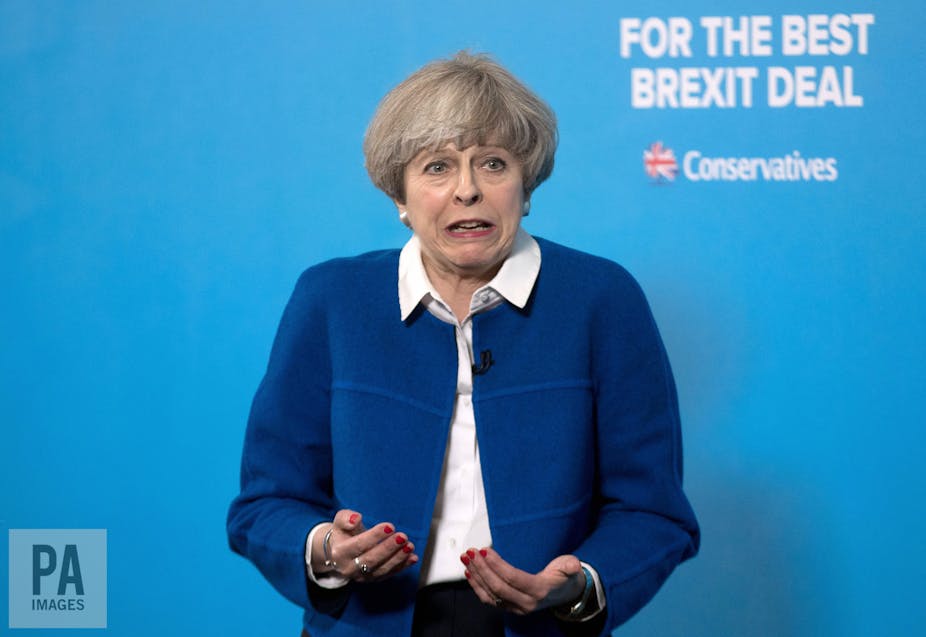The ignoble art of not answering questions has been on display throughout the 2017 general election campaign. Several TV debates have shown that the public is getting much better at posing tough questions (perhaps they are learning from political journalists), but the result is that politicians are under greater pressure to evade and equivocate.
Audiences are also getting smarter at spotting techniques of evasion. In previous research, my colleagues and I have identified 36 ways of not answering questions. But there are always more to come.
Theresa May tried something else, for example, when she faced a live audience in York for a BBC Question Time special on June 2. In response to a question about the fall in real terms of nurses’ pay, she initially avoided the issue by talking about only public sector pay (not mentioning nurses). Then she niftily sidestepped further questions about lack of NHS funding by raising the issue of parity of esteem between physical and mental health.
This diversionary tactic was smartly spotted by one audience member who observed: “I think it’s fair to say that mental health funding is one of your soundbites whenever people ask you about the NHS.” Perhaps this audience member had just identified a 37th way of not answering questions – the use of diversionary soundbites.
Reply rates
So just how evasive is May? I’ve previously written about her special technique for not answering questions. For several decades, I’ve been monitoring the extent to which politicians answer questions in interviews in terms of reply rate – the proportion of questions which receive an explicit answer. At 14%, May’s reply rate in her first interview with Andrew Marr as prime minister was dramatically low. In previous studies of 33 interviews in the 1980s and 1990s (with John Major, Margaret Thatcher, Neil Kinnock, and Paddy Ashdown), we found an average reply rate of 46%. However, May’s reply rate had improved when she went up against Marr again in October, climbing to 42%.
In the current election campaign, May has been widely criticised for her evasiveness. In order to evaluate this criticism, I decided to compare her interview performance with that of Labour leader Jeremy Corbyn. I selected four interviews – two each from two prominent British interviewers, Andrew Neil and Andrew Marr. The most striking finding of this analysis was the remarkable similarity between the reply rates for the two politicians: in the Marr interviews, Corbyn (31%), May (29%); in the Neil interviews, May (25%), Corbyn (24%).

Both politicians equivocated to the majority of questions posed, but notably, they did so in different ways. May’s particular speciality is what I have termed “non-specific answers to specific questions”. She talks about issues raised but does not give the particular information requested. In addition, she makes use of deferred replies (putting off an answer to the future), for example, to questions about the cap on social care, about raising national insurance, and about which pensioners would lose their winter fuel allowance under her manifesto plans. So in response to the question: “How many pensioners will lose their winter fuel allowance”, she deferred an answer by saying, “… we will consult, we will ask people, charities, organisations at what level that should be set”.
Through both non-specific responses and deferred replies, May committed herself to nothing, and gave herself the maximum freedom of manoeuvre. But that did also leave her vulnerable to Neil’s accusation that her ideas were “uncosted and half-baked”.
Corbyn’s Achilles heel is defence, and especially the issue of whether to renew Trident. Neil asked Corbyn no less than eight times whether he personally would support the renewal of Trident, but on each occasion Corbyn equivocated. Notably, Corbyn did what many people in organisations do when asked for a personal opinion. He sheltered behind the organisation, reiterating several times that maintaining Trident is Labour party policy, while never explicitly saying whether or not he personally supported its renewal.
As Neil pointed out, in the defence review that Corbyn plans to undertake if he becomes prime minister, he could “ditch it [Trident] right away”. Just like May, Corbyn committed himself to nothing, leaving him free to continue campaigning against Trident renewal.
Overall, in these four interviews I found no evidence that May equivocated any more than Corbyn. Although they equivocated on different issues, they arguably did so for much the same reason – that is, to avoid commitment and maintain their freedom of manoeuvre.
Politicians arguably behave like other politicians for similar reasons, and have been doing so for many centuries. Notably, over 400 years ago, when Queen Elizabeth I received a parliamentary delegation advising her to execute Mary Queen of Scots, she expressed the hope that the MPs would, in her memorable phrase, “take in good part my answer answerless”. In other words, she committed herself to nothing, and retained her freedom of manoeuvre. Things don’t seem to change – answerless answers are still very much in vogue.

